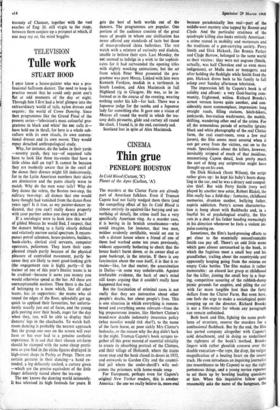Tulle work
TELEVISION STUART HOOD
I once knew a house-painter who was a pro- fessional ballroom dancer. The need to keep in practice meant that he could only paint one's flat at odd moments of the day or night. Through him I first had a brief glimpse into the extraordinary world of tails, nylon dresses and sequins: the world of Come Dancing. Since then programmes like the Grand Final of the present series—`television's most colourful pro- gramme in black and white' the Bac calls it— have held me in thrall, for here is a whole sub- culture with its own rituals, its own conven- tional dresses and its own mores. They would repay detached anthropological study.
Why, for instance, do the ladies in their yards —seventy yards, they say—of sequined tulle have to look like those tea-cosies that have a little china doll on top? It cannot be because they are modestly aware that in the swirl of the dance their dresses might lift indecorously, for in the Latin American numbers their skirts are diminutive and the pants clearly worn to match. Why do the men wear tails? Why do they dance the veleta, the Boston two-step, the military two-step: all dances that one would have thought had vanished from the dance-floor years ago? Is it true, as my painter-dancer in- dicated, that you can't really dance properly with your partner unless you sleep with her?
If a sociologist were to look into this world of gilded Meccas he would find, I suspect, that the dancers belong to a fairly clearly defined and relatively narrow social spectrum. It encom- passes petrol salesmen, house-painters, builders, bank-clerks, clerical civil servants, computer operators, policemen. They learn their com- plicated rituals partly because of the physical pleasure of controlled movement, partly be- cause they are likely to meet good-looking girls (the engagement rate is high), partly—if the trainer of one of this year's finalist teams is to be credited—because it saves you money you would otherwise spend at the bar. All these are unexceptionable motives. Then there is the fact of belonging to a team which, like all other teams, has its supporters: the mums who sit round the edges of the floor, splendidly got up, quick to applaud their favourites, but unfortu- nately usually just out of focus, and the young girls peering over their heads, eager for the day when they, too, will be able to display their dancers' legs in the chachacha. To watch ball- room dancing is probably the nearest approach that the group one sees on the screen will ever have or has ever had to a genuine aesthetic experience. It is sad that their chosen art-form should be stamped with the same cheap pretti- ness as you find in the china figures displayed in high-street shops in Purley or Penge. There are certain gestures in their dancing—a hand ex- tended, a leg delicately cocked, a curtsey given —which are the precise equivalent of the little finger delicately raised above the tea-cup.
The BBC knows the dancing world intimately. It has televised its high festivals for years. It
gets die best of both worlds out of the dancers. The programmes are popular. One portion of the audience consists of the great mass of people to whom our civilisation has never offered any standards of taste but those of mass-produced china ballerinas. The rest watch with a mixture of curiosity and disdain, unable to believe their eyes. Last Monday, the BBC seemed to indulge in a wink to the sophisti- cates for it had surrounded the opening titles with slightly mocking animations; but the set from which Peter West presented the pro- gramme was pure Mecca. Linked with him were Kenneth Fordyce, modish in a turtleneck in South London, and Alex Macintosh in full Highland rig in Glasgow. He was, as he in- formed us in the course of the evening, wearing nothing under his kilt—for luck. There was a Japanese judge for the samba and a Japanese lady for something else. It gave one a vision of Meccas all round the world in which the tea- cosy dolls pirouette, glide and curtsey all round the clock. I found it, in the end, curiously sad.
Scotland lost in spite of Alex Macintosh.






































 Previous page
Previous page